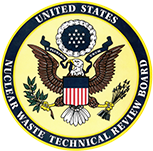The U.S. Nuclear Waste Technical Review Board (Board) will hold a virtual public meeting on Wednesday, May 12, 2021, and Thursday, May 13, 2020, beginning at noon (Eastern Daylight Time) each day, to review information on the U.S. Department of Energy’s activities to evaluate advanced nuclear fuels including accident tolerant fuels for light water reactors and the impact of these fuels on spent nuclear fuel management and disposal.
- Nuclear Waste Technical Review Board
- Our Work
- Press Releases
Share Tools
AddThis Sharing Buttons
Press Release
On April 30, 2021, the U.S. Nuclear Waste Technical Review Board issued a report to Congress and the Secretary of Energy titled Six Overarching Recommendations for How to Move the Nation’s Nuclear Waste Management Program Forward.
The U.S. Nuclear Waste Technical Review Board (Board) will hold a virtual public meeting on Wednesday, May 12, 2021, and Thursday, May 13, 2021, to review information on the U.S. Department of Energy’s (DOE) activities to evaluate advanced nuclear fuels including accident tolerant fuels for light water reactors and the impact of these fuels on spent nuclear fuel management and disposal.
The U.S. Nuclear Waste Technical Review Board (Board) will hold a virtual public meeting on Wednesday, December 2, 2020, and Thursday, December 3, 2020, beginning at noon (Eastern Standard Time) each day, to review information on the U.S. Department of Energy’s (DOE) non-site-specific geologic disposal research and development (R&D) program.
The U.S. Nuclear Waste Technical Review Board will hold a virtual public meeting on Monday, July 27, 2020, and Tuesday, July 28, 2020, to review information on
U.S. Department of Energy (DOE) research and development (R&D) activities related to disposal in a geologic repository of commercial spent nuclear fuel (SNF) in dual-purpose canisters (DPCs), which are designed for storage and transportation but not for disposal.
On January 27, 2020, the U.S. Nuclear Waste Technical Review Board issued a report to Congress and the Secretary of Energy titled Filling the Gaps: The Critical Role of Underground Research Laboratories in the U.S. Department of Energy Geologic Disposal Research and Development Program.
The U.S. Nuclear Waste Technical Review Board will hold a public meeting in Alexandria, Virginia, on Tuesday, November 19, 2019, to review information on U.S. Department of Energy (DOE) research and development (R&D) activities related to drying, packaging, and dry storage of spent nuclear fuel (SNF), including aluminum-clad SNF.
On September 23, 2019, the U.S. Nuclear Waste Technical Review Board released a Report to Congress and the Secretary of Energy on Preparing For Nuclear Waste Transportation. The report is a product of a multi-year effort, during which the Board reviewed the Department of Energy’s activities related to the eventual transportation of spent nuclear fuel and high-level radioactive waste.
The U.S. Nuclear Waste Technical Review Board will hold a workshop on Wednesday,
April 24, and Thursday, April 25, 2019, on recent advances in repository science and operations from international underground research laboratory (URL) collaborations.
The report is based on presentations and discussions at the Board’s March 27, 2018, meeting on that topic held in Washington, D.C. The report records the views of experts from several countries who made presentations at the meeting on challenges intrinsic to both monitoring and waste retrieval. It also includes Board observations based on the meeting discussions.
The U.S. Nuclear Waste Technical Review Board will hold a public meeting in Idaho Falls, Idaho, on Wednesday, June 13, 2018, to review technical issues that need to be addressed before the Department of Energy (DOE) begins a nationwide effort to transport spent nuclear fuel (SNF) or high-level radioactive waste (HLW).
The U.S. Nuclear Waste Technical Review Board will hold a public meeting in Washington, D.C. on Tuesday, March 27, 2018, to review information related to operational and performance confirmation monitoring of a geologic repository and retrievability of emplaced high-level radioactive waste (HLW) and spent nuclear fuel (SNF).
On December 29, 2017, the U.S. Nuclear Waste Technical Review Board published on its website a Report to Congress and the Secretary of Energy on Management and Disposal of U.S. Department of Energy Spent Nuclear Fuel.
On December 29, 2017, the U.S. Nuclear Waste Technical Review Board released a Report to Congress and the Secretary of Energy on Management and Disposal of U.S. Department of Energy Spent Nuclear Fuel. The report is a product of three years of effort, during which the Board reviewed the Department of Energy’s (DOE) activities related to managing the inventory of spent nuclear fuel (SNF) that is under DOE control at four federal facilities, representing approximately 99% by mass of the total quantity of DOE SNF.
The U.S. Nuclear Waste Technical Review Board held an open public meeting in Richland, Washington, on Wednesday, June 21, 2017, to review information on recent U.S. Department of Energy (DOE) research activities related to corrosion and long-term performance of borosilicate high-level radioactive waste (HLW) glass.
Chairman of the U.S. Nuclear Waste Technical Review Board, Dr. Rodney C. Ewing, has announced his resignation as member and Chairman of the Board, effective January 5, 2017.
The U.S. Nuclear Waste Technical Review Board met in Washington, D.C. on August 24,
2016, to review U.S. Department of Energy (DOE) activities related to integrating the management and disposal of the many different designs of canisters for spent nuclear fuel (SNF) and high-level radioactive waste (HLW) that are currently in service and under development.
The report is an update of a survey report issued by the Board in 2009, in which the Board described 30 technical and institutional attributes of nuclear waste programs in 13 countries.
The report presents the Board’s findings, conclusions, and recommendations related to activities being undertaken by the U.S. Department of Energy (DOE) to assess the feasibility of deep borehole disposal of some high-level radioactive waste (HLW), including a planned Deep Borehole Field Test to obtain technical information and understanding of critical processes related to deep borehole disposal.
